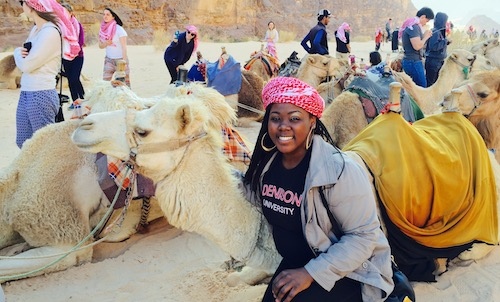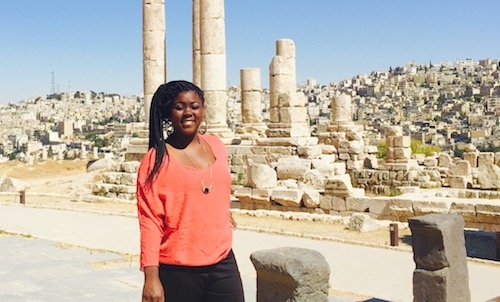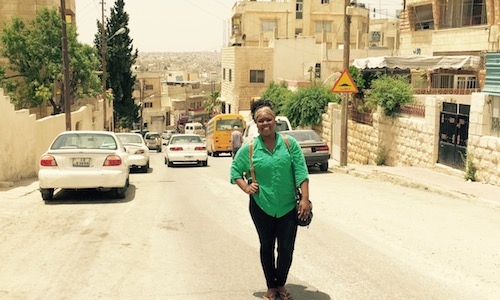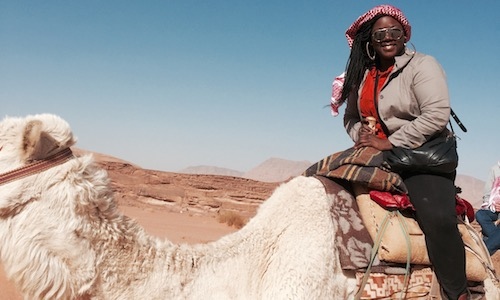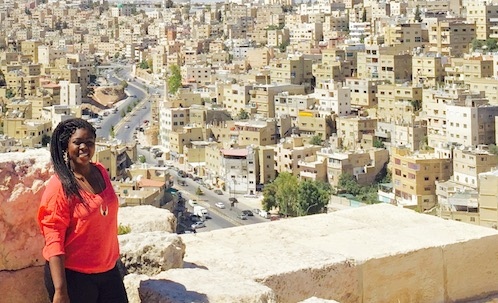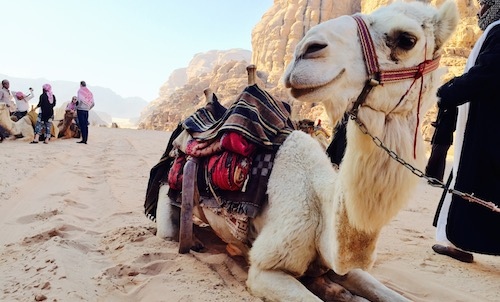With 22 Arab nations in the Middle East and North Africa that speak the same tongue as their official language, and with numerous other Muslim nations where Arabic is significant, Arabic language and culture are vitally relevant to today’s global landscape. The understanding of Arabic is opening doors for students in a wide range of disciplines, from political science to economics, to history, international studies, arts and religion.
For Keylee Jones ’16, an anthropology/sociology major who immersed herself in the Arabic courses of study, it was the Arabic option that attracted her to Denison, having studied several of the European languages during her high school years in St. Louis.
“What held my interest is it was the first language and culture I experienced that was different from American and European culture,” she said. It also gave her an opportunity to learn about the Islamic religion. “I was learning about an entirely new group of people. It’s something that really stuck with me.”
The 21st century is a time when college students no longer regard a foreign language course as an annoying graduation requirement, said Christine Armstrong, chair of the Department of Modern Languages.
“More students realize the importance of knowing at least one language other than English as they start their studies,” Armstrong said. “Many want to deepen their knowledge of the language, cultures and literatures they studied in high school, and plan to spend a semester abroad during their junior year in a country where they will use that language.”
Currently, students interested in Arabic can take as many as six courses, which are equivalent to three years of Arabic study, said Assistant Professor Hanada Al-Masri, who teaches Arabic language and culture.
Al-Masri said that not only did the events of Sept. 11 increase students’ awareness of the Arabic world and its language, it changed how the course was taught. Earlier models from the 17th century through the 20th century involved mostly scholarly work such as research, she said.
“Students became more interested in studying Arabic for cultural reasons. They want to understand the Arabs, their religion, their traditions, their beliefs and values, and their ways of thinking,” said Al-Masri, a native Jordanian who studied at the University of Jordan as well as in the United States. “Students take other content courses in other departments to gain a better understanding of deeper issues like the relation between the East and the West and issues of Anti-Americanism and extremism.”
“If you study a language, you can’t study the language without coming across the culture,” said Jones, who already has spent six months in Jordan as well as visiting Israel, Egypt and Palestine. “A lot of the words and phrases have cultural meaning.”
The ideal of promoting better understanding between nations is not lost on Jones, who is headed back to Jordan for the summer of 2016, thanks to a Critical Language Scholarship she received from the U.S. Department of Education as she works toward fluency in Arabic.
“I want to be able to use my language skills in everyday life – maybe work with a nonprofit organization that focuses on peace-building between nations,” she said. “Basically I want to work in human rights. That’s a good way to foster peace.”
“When they’re thinking about their liberal arts skills, students are thinking about becoming global citizens,” Al-Masri said, particularly when they choose a non-European language. “They start thinking about job opportunities, the humanitarian effect and help, and being benevolent in the sense of giving. This is particularly emphasized by the latest crisis in Syria.”
Students are imaginative when choosing an academic pathway. Armstrong said many of those taking Arabic are also political science, psychology and international studies majors. Al-Masri adds education and women’s studies to the list.
“They’re already starting to think about job opportunities,” Al-Masri said. “Denison students are good at finding correlations across majors.”
Awaiting students with Arabic language skills and knowledge of the culture are government jobs in the Department of Defense and other government-related jobs such as translators, teachers, counselors, non-governmental organizations, the Peace Corps or pursuing Middle Eastern studies in graduate school, she said.
“For more than 10 years, the U.S. government has made it known it needs personnel with linguistic skills and cultural competency in other languages,” Armstrong said. “In fact in 2005, the National Language Conference wrote a white paper entitled ‘A Call to Action for National Foreign Language Capabilities’ that identifies areas in need of urgent attention both for the present and the future, such as the development of critical language skills.”
The Partnership for Public Service has issued a paper listing the Top Agencies for Foreign Languages, which included the departments of Homeland Security, Defense, Justice and Agriculture. The total number of positions found in these agencies was 44,494, with the majority being in the Department of Homeland Security.
Al-Masri said Arabic classes use the “Communicative Integrated” approach, which integrates the teaching of both Modern Standard Arabic to develop reading and writing skills, and Educated Spoken Arabic to enhance speaking and listening skills.
“This integration addresses the ‘diglossic’ situation in the Arab world where Modern Standard Arabic is the language of the media and formal contexts,” Al-Masri said, “and Spoken Arabic is the language of everyday communication.”
Jones said the Arabic language has its challenges, especially with its grammar.
“There are a lot of rules and a lot of exceptions to the rules, even more than there are rules,” she said.
As for writing: “It feels natural for me. You don’t have to lift your pen. It’s kind of like backwards cursive. I really enjoy writing Arabic.”
With both her academic work and experiences abroad, Jones believes she approaching her goal of fluency in Arabic.
“I’m conversational. I’d reach the advanced level of Arabic before I went to Jordan,” she said, then gaining confidence while engaging with the people in Arabic nations. “Being over there, you have no other choice but to speak.”

